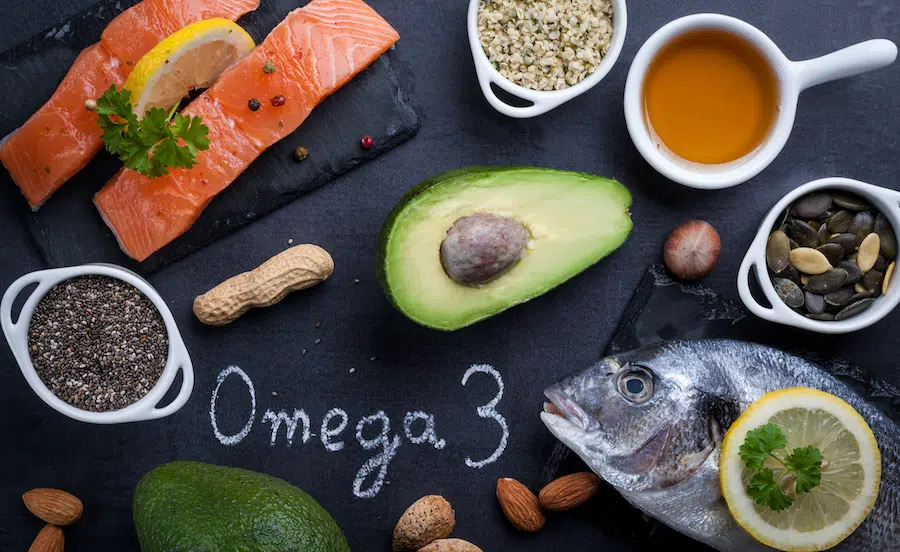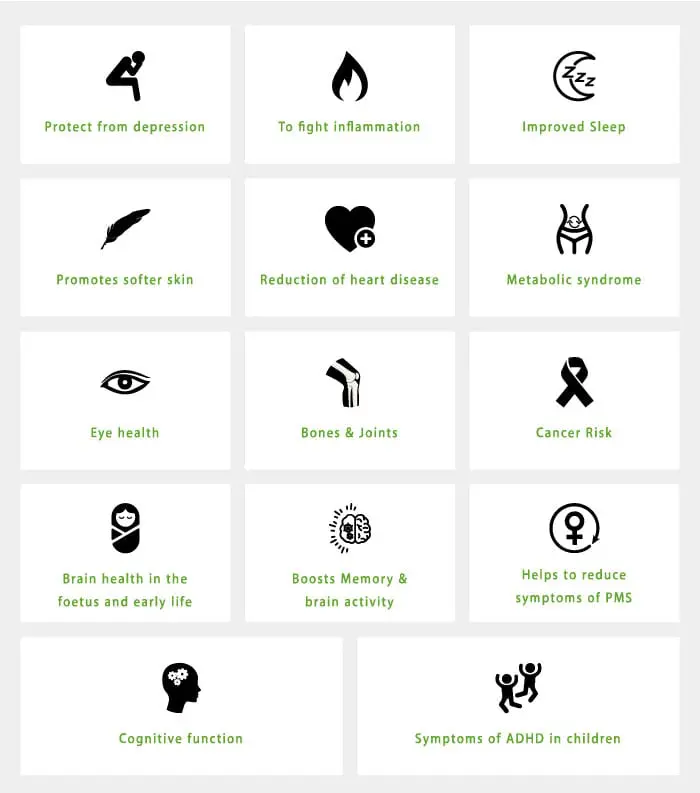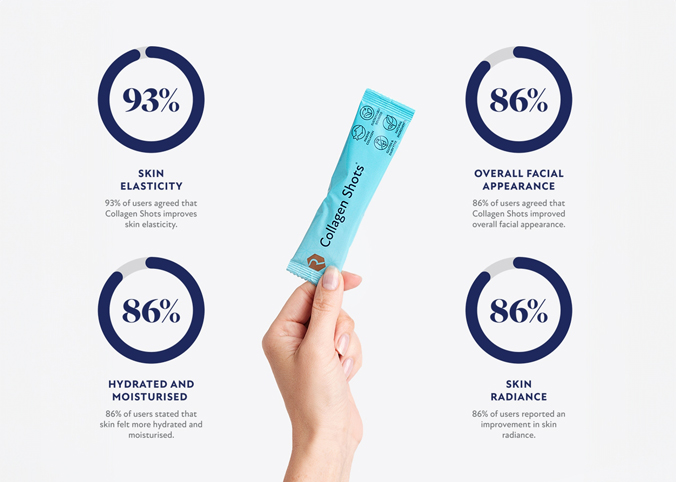14 Reasons You Need Omega-3 for Your Heart, Mind, Skin and Health

We’ve all heard that one of the keys to a healthier, happy body is enjoying more omega-3s in our diet. But, have you ever stopped to wonder why we need to have more of this miracle fatty acid? Omega 3 is one of the most studied nutrients and it is one that the body can not make naturally so read on to discover how to get enough of it and how it can transform your heart, mind and benefit the skin…
What is Omega-3?
Omega-3 is an essential fatty acid – it’s essential for a reason! We need it for the body to function properly, which is why it’s known as an essential fatty acid. In fact, our bodies need omega-3s for every single cell, yet the majority of us do not eat enough to nourish the body to its optimum.
The problem is, we can’t synthesise omega-3s naturally. For this reason, we need to get our daily requirements from the food that we eat or in supplement form.
What Are Essential Fatty Acids?
Omega-3s are a specific type of polyunsaturated fatty acid (PUFA). While it may sound scientific, they have several double bonds in their chemical structure. All omega-3s have the first double bond placed three carbon atoms away from the omega end.
Our body can create saturated fatty acids, but we don’t have an enzyme that will put the double bond where it belongs to make omega-3. This is why we need to get omega-3 from our diet.
To make things a little more complex, there are three types of omega-3s found in food:
1) Docosahexaenoic Acid (DHA)
DHA is 22-carbon-long omega-3 fatty acid. It’s most often found in oily fish, krill oil and algae oil. However, breast milk is also high in DHA, so it’s added to formula milk for babies and infants who are bottle fed. DHA is a structural component in cell walls, particularly in nerve cells in the brain, cerebral cortex, skin and retina.
It can also affect how the brain develops and functions, and can determine brain structure and protect brain tissue from damage.
The benefits of DHA
DHAs is crucial for the health structure and function of our brain and many other parts of the body. Here’s what it can do for you:
i) DHA protects brain tissue from inflammatory damage and reduces pro-inflammatory molecules in the brain.
ii) DHA stimulates physical changes that help learning and optimal memory function.
iii) DHA promotes healing after an injury to brain tissue.
iv) Studies show that omega-3 – particularly DHA – can help to keep our heart and blood pressure healthy. DHA can decrease triglycerides (the so-called ‘bad’ cholesterol), increasing the ‘good’ HDL cholesterol and assisting with healthy blood pressure rates.
2) Eicosapentaenoic Acid (EPA)
Next up in the omega-3s is EPA, a 20-carbon-long omega-3 fatty acid found in the same foods as DHA.
EPA is a powerful antioxidant, mopping up free radicals within the body. Some doctors believe that EPA also plays a key role in the brain. Although it is rapidly oxidised by our brains, this powerful oxidisation is thought to play a part in long-term brain health and may even be helpful in treating depression.
EPA levels are constantly under demand and science shows that low levels have been linked to mental health issues, including depression, heart problems, joint and bone conditions, and neurodegenerative diseases such as MS and Parkinson’s.
The benefits of EPA:
1) Supports and protects against mental health issues.
2) May help with dyslexia and dyspraxia.
3) Supports protection of the heart.
4) Helps in the protection of bones and joints.
5) Helps to protect against neurodegenerative diseases
6) Protects our genes and cell cycle.
7) Helps to promote softer, smoother skin.
8) Helps to keep the stress response regulated.
Our bodies can convert DHA to EPA if we have more DHA in the body, it will strive to keep the two in harmony.
3) Alpha-Linolenic Acid, aka ALA:
ALA is an 18-carbon-long omega-3 fatty acid. It is found in certain plants that are high in fat – think chia seeds, walnuts and flax. This is the most abundant omega-3 in our modern diet, but it’s not very active within the body and must be converted to EPA and DHA.
Can plants provide adequate amounts of omega-3 for health?
More and more, people are becoming vegan or vegetarian. As a result, they need to get their daily omega-3 fix from plant sources- walnuts, for example, are rich in omega-3s.
However, the problem is that, while walnuts and oily fish are both needed in a healthy diet, the quality of omega-3 within them is very different. Of the three main types of omega-3 fatty acids, plant foods typically only contain alpha-linolenic acid (ALA) ALA is not as active in the body and must be converted into the other forms of omega 3, DHA and EPA. In fact, the fats found in fish are more easily available to us and healthier than those in walnuts.
The human body cannot make EPA or DHA, and the only way our body can get them is by eating them directly (from fish) or using a building block like ALA. The body can take ALA to make EPA and DHA in the liver.
Since the body needs to work extra hard to make EPA and DHA when it receives ALA, it’s not as efficient. The composition is different, and we cannot replicate the exact reactions that come directly from the EPA and DHA found in fish.
Philip C. Calder, professor of Nutritional Immunology at the University of Southampton says: “The human body can convert the plant omega-3s into the fish omega-3s but in many people this process does not seem to work very well. One reason for that might be the high amount of omega-6s that people eat – these stop the body’s conversion of plant omega-3s.”
This means that people who get their omega-3s from plants tend to have low levels of DHA and EPA.
However, the discovery of algae oils which are rich in both DHA and EPA have changed this for good. These are the algae that fish feed on, and the plant that gives fish their own unique source of omega-3s. Rejuvenated has even found a concentrated form of this algal omega oil to create Aliol, a potent vegan omega-3 source, a potent vegan omega-3 source. Read more further on…
What is omega-6?
Omega-6 is an essential fatty acid and, like omega-3, it cannot be produced by our bodies. Omega-6 is essential for all sorts of things, such as brain health, strong bones, helping to regulate metabolism, and skin and hair growth.
Our modern Western diets are full of omega-6s, thanks to the increase of corn and sunflower oil in food manufacturing. This might sound great, but it has drastically changed the relationship between omega-6 and omega-3 in our bodies.
Unfortunately, the imbalance of omega-6/omega-3 polyunsaturated fatty acids in Western diets has been linked to inflammatory diseases and associated with depression.
Historically, our body’s balance of omega-6 and omega-3 were in harmony, but now the ratio is around 7:1 in Europe, while in the US it can be as imbalanced as 15:1.
It is important to reduce omega-6 consumption and increase the levels of omega-3.

What are the benefits of omega 3?
1) Helps to protect from depression
Omega 3s can help us to overcome depression and anxiety. Thankfully there are now campaigns in the media which highlight the importance of mental health, and there is a new openness and recognition of the illness.
Initial studies show that those who consume omega-3s on a regular basis are less likely to suffer from depression*.
2) Helps fight inflammation
How marine omega-3s fight inflammation and other nasties within the body has been the subject of many studies over the years. However, after endless research, most scientists believe that marine omega-3s do play a crucial role in reducing inflammation.
3) Improves sleep
We all need to get in at least 7 and 1/2 hours of sleep each night to thrive and feel our best. Yet, if you struggle with insomnia, then you may be interested to know that sleeping problems have been linked to low levels of omega-3. Ensuring that you are getting adequate amounts of omega may help to improve your sleep pattern and general health.
4) Promotes softer, more hydrated skin
Want glowing, beautiful skin? Omega-3s are nature’s very own moisturiser! DHA and EPA nourish your skin by managing oil production, helping you to stay beautiful from the inside, out. Omega 3 fatty acids play an essential role in the structure and appearance of the skin. The precious combination of these oils are incorporated into cell membranes in the uppermost layer of the skin, the epiderms forming a protective web to help prevent moisture being lost.
They also go to work deep in the lower layer of skin at the dermis to control inflammation.
5) Associated with the reduction of heart disease
Omega-3s may help to prevent the build-up of plaque, which causes hardening of the arteries. They are also associated with reducing blood pressure levels. A study found that eating three portions of salmon a week for eight consecutive weeks lowered blood pressure in young, overweight participants.
6) Reduces symptoms of Metabolic syndrome
Metabolic syndrome makes people more likely to develop heart disease, stroke or diabetes. Triggers include high blood sugar and blood pressure, abdominal obesity, high triglycerides and low HDL cholesterol levels.
Studies show that eating plenty of omega-3s can improve symptoms and help to protect from related diseases.
7) Boosts memory and keeps the mind active
Lower levels of DHA in adults have been linked to a smaller brain size, a sign of accelerated brain ageing.
8) Improves bone and joint health
As we age, bone can lose its density and lead to problems such as osteoporosis. Omega-3 enhances the benefits of vitamin D to improve overall bone strength and the synthesis of bone collagen.
Studies have also been carried out on the effect on arthritis. While many users say that it does ease joint pain, it hasn’t yet been clinically proven.
9) Help to improve cognitive function
Omega-3s have been linked to improvements in cognitive functioning. Increased levels are associated with enhanced task performance.
10) May lower cancer risks
Studies show that those who consume more, long–chain omega-3s (DHA and EPA) seem to have a lower risk of certain bowel cancers.
There have also been positive reports with other cancers but it is still very early days.
11) Improves eye health
DHA, in particular, is part of the retina of the eye – without enough DHA, vision problems can strike. Getting enough omega-3 has also been linked to a reduced risk of macular degeneration.
12) Brain health in the foetus and early life
DHA and EPA are crucial to the development of the brain during the foetal stage and in early years. Breast milk is also important at this time as it contains high levels of DHA – if a mother isn’t breastfeeding, then it’s important to ensure that the formula used is fortified with adequate DHA levels.
13) May reduce symptoms of ADHD in children
Supplementing with EPA and DHA may help to reduce problems with asthma, ADHD and autism.
14) It can ease PMS
If you suffer every month from PMS, then omega-3 could help to reduce your symptoms. Research has found that it could even lower mood swings and anxiousness.
Omega-3 fatty acids also help to boost the production of anti-inflammatory prostaglandins, which reduce the levels of another prostaglandin, associated with swelling and pain.
Recommended Dosage
So, how much do we need of wondrous omega-3s? It’s recommended that you consume 250 -500 mg of EPA and DHA combined each day. However, if you have any health concerns, we would recommend that you seek the advice of a healthcare practitioner.
Can I get enough Omega-3 from my diet?
The best sources of omega-3s are oily fish, eggs and turkey. Nuts, seeds and soy are also good sources.

Studies
Omega-3 Fatty Acids and Depression: Scientific Evidence and Biological Mechanisms.
Giuseppe Groso, Fabio Galvano, Stefano Marventano, Michele Malaguarnera, Claudio Bucoli, Filippo Drago, Filippo Caraci.This is the most abundant omega-3 in our modern diet






